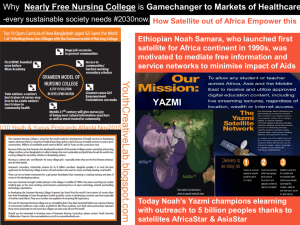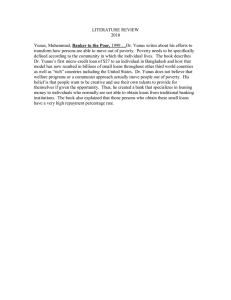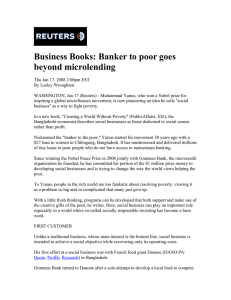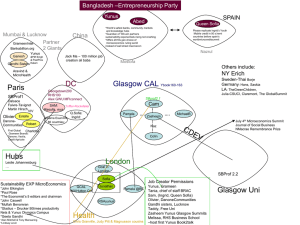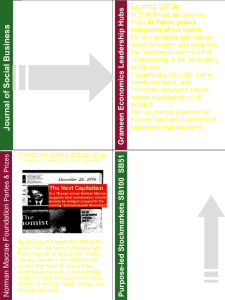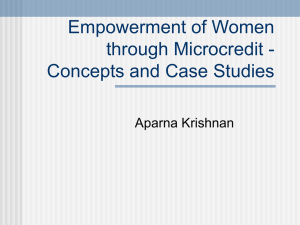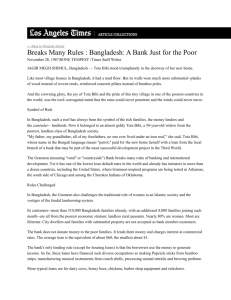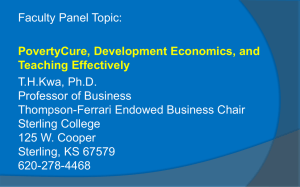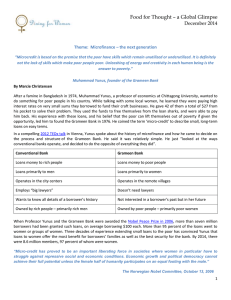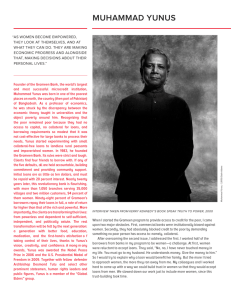A TOUR OF INTERNSHIP AT THE GRAMEEN BANk IN
advertisement
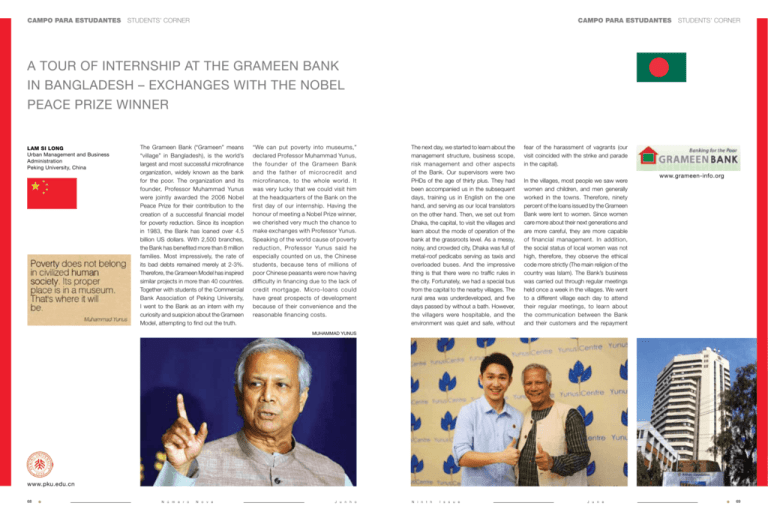
Campo para estudantes Students’ Corner Campo para estudantes Students’ Corner A TOUR OF INTERNSHIP AT THE GRAMEEN BANK IN BANGLADESH – EXCHANGES WITH THE NOBEL PEACE PRIZE WINNER LAM SI LONG Urban Management and Business Administration Peking University, China The Grameen Bank (“Grameen” means “village” in Bangladesh), is the world’s largest and most successful microfinance organization, widely known as the bank for the poor. The organization and its founder, Professor Muhammad Yunus were jointly awarded the 2006 Nobel Peace Prize for their contribution to the creation of a successful financial model for poverty reduction. Since its inception in 1983, the Bank has loaned over 4.5 billion US dollars. With 2,500 branches, the Bank has benefited more than 8 million families. Most impressively, the rate of its bad debts remained merely at 2-3%. Therefore, the Grameen Model has inspired similar projects in more than 40 countries. Together with students of the Commercial Bank Association of Peking University, I went to the Bank as an intern with my curiosity and suspicion about the Grameen Model, attempting to find out the truth. “We can put poverty into museums,” declared Professor Muhammad Yunus, the founder of the Grameen Bank and the father of microcredit and microfinance, to the whole world. It was very lucky that we could visit him at the headquarters of the Bank on the first day of our internship. Having the honour of meeting a Nobel Prize winner, we cherished very much the chance to make exchanges with Professor Yunus. Speaking of the world cause of poverty reduction, Professor Yunus said he especially counted on us, the Chinese students, because tens of millions of poor Chinese peasants were now having difficulty in financing due to the lack of credit mortgage. Micro-loans could have great prospects of development because of their convenience and the reasonable financing costs. The next day, we started to learn about the management structure, business scope, risk management and other aspects of the Bank. Our supervisors were two PHDs of the age of thirty plus. They had been accompanied us in the subsequent days, training us in English on the one hand, and serving as our local translators on the other hand. Then, we set out from Dhaka, the capital, to visit the villages and learn about the mode of operation of the bank at the grassroots level. As a messy, noisy, and crowded city, Dhaka was full of metal-roof pedicabs serving as taxis and overloaded buses. And the impressive thing is that there were no traffic rules in the city. Fortunately, we had a special bus from the capital to the nearby villages. The rural area was underdeveloped, and five days passed by without a bath. However, the villagers were hospitable, and the environment was quiet and safe, without fear of the harassment of vagrants (our visit coincided with the strike and parade in the capital). In the villages, most people we saw were women and children, and men generally worked in the towns. Therefore, ninety percent of the loans issued by the Grameen Bank were lent to women. Since women care more about their next generations and are more careful, they are more capable of financial management. In addition, the social status of local women was not high, therefore, they observe the ethical code more strictly (The main religion of the country was Islam). The Bank’s business was carried out through regular meetings held once a week in the villages. We went to a different village each day to attend their regular meetings, to learn about the communication between the Bank and their customers and the repayment www.grameen-info.org Muhammad Yunus www.pku.edu.cn 68 N ú m e r o N o v e J u n h o N i n t h I s s u e J u n e 69 Campo para estudantes Students’ Corner Campo para estudantes services. At a meeting, there would be one representative for each family, and five representatives constituted a team. The team leader was responsible for liaison and oversight of the team members. According to the regulations, each team member could get a one-year loan from a branch of the Bank, and must repay a certain amount of the loan at each regular meeting. The annual interest rate of the loan was 10-20% (if the repayment followed the schedule, the rate usually was only 10%). Since women often chat among themselves, most of them would repay the loan on time in order to avoid degrading their family. In particular, the team was not jointly and severally liable. If a member could not afford to repay the loan, the Bank commissioner and the team 70 N ú m e r o N o v e Students’ Corner begging. It was intended to change their habit of begging, and teach them about the right path of self-reliance and dignity. leader would pay a visit to the home of such member to learn about the causes and find solutions together. The costs of such type of loan management were high. However, because the Bank is a nonprofit organization, such high cost may be justified by its effectiveness in terms of poverty reduction. J u n h o We cannot help but doubt that can a small amount of loan get the poor out of poverty? In fact, we should not underestimate the wisdom of the poor. They would try to make money out of the borrowed money by raising chickens for eggs, renting lands to grow vegetables, buying looms to make cloth, buying a tricycle to transport passengers, opening a grocery to sell goods and so on. And since Bangladesh is a developing country, there is a great demand for such small N i n t h I s s u e businesses, which indeed can get the poor out of poverty. Such small business allowed the poor to make a profit in a short time, so they can make the repayment each week on time. However, once there was a flood (Bangladesh is known as “a country of waters”), the Bank would provide flexible repayment provisions and disaster relief loans, which would offer interestfree instalment to ensure the basic living conditions of the poor. Interestingly, the Bank would lend money to beggars, so that they can sell commodities when they were J u n e These novel ideas shook the minds of the students of our class, the socalled elite students. Professor Yunus said, “Credit is a human right.” As long as the poor were given a chance to borrow money, complemented by certain enlightenment, everyone can become selfreliant. As residents of Macao, we have more opportunities than people from other places to go to school and get a job. There is no excuse for us to complain and worry about money and houses. Everybody has something that they were born to be good at. Everyone can become self-reliant as long as they acquire a skill. The success of the Grameen Bank proves to me that the poor should not be worried and the rich should not be proud, because a family would not remain poor or rich forever. • 71
